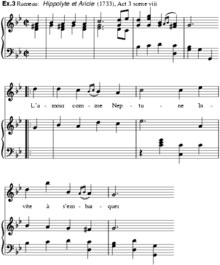Hippolyte et Aricie
| Work data | |
|---|---|
| Original title: | Hippolyte et Aricie |
| Shape: | Tragédie lyrique |
| Original language: | French |
| Music: | Jean-Philippe Rameau |
| Libretto : | Simon-Joseph Pellegrin |
| Literary source: | Racine : Phèdre |
| Premiere: | October 1, 1733 |
| Place of premiere: | Académie royale de musique in Paris |
| Place and time of the action: | Greek mythology |
| people | |
Hippolyte et Aricie is a baroque opera in five acts by Jean-Philippe Rameau , the libretto is by Abbé Simon-Joseph Pellegrin . It is Rameau's first opera; he wrote it in 1733 at the age of 50. In the same year the world premiere took place in Paris. The opera's dramatic-musical structure does not differ from Lully's tragedies, in which a prologue is followed by five acts. The number of figures is small, the dances and choir scenes occupy an important position.
action
Phaidra , the second wife of King Theseus of Athens, loves her stepson Hippolyte . Hippolyte does not return her love, but desires Aricie (Arikia), the daughter of the previously killed King Pallas.
Theseus follows his friend Peirithous into the underworld . He is being held there because he tried to kidnap Hades ' wife , Proserpina .
After Theseus disappeared, Phaidra banishes Aricie to the temple of the chaste Diana priestesses. When her rival is banished, she confesses her love to Hippolyte, but Hippolyte rejects her. Phaidra then hands her stepson a sword with which he is supposed to kill her. At that moment, Theseus enters, who has returned from the underworld. The noble Hippolyte refrains from accusing Phaidra, but now comes under suspicion himself, because Oenone, Phaidra's wet nurse, explains the situation with a lie. She claims that Hippolyte wanted to kill his stepmother because she rejected him.
Theseus now asks his father, the sea god Neptune , to destroy Hippolyte. A large sea monster appears and the prince disappears in glowing flames. Shaken by this event , Phaidra, lying in agony , now confesses everything to her husband before she judges herself. The king also wants to commit suicide because he destroyed his own son through his prayer to Neptune. However, he receives the relieving news from his father that Diana, the goddess of the hunt, saved Hippolyte from death. Diana makes Hippolyte the king of the forest dwellers and gives him his beloved Aricie. Hippolyte lives, but Theseus will never see his son again.
history
The audience of the premiere was divided into the conservative "Lullysten", who thought Rameau's music was too modern because it did not correspond to the tradition of Jean-Baptiste Lully , and the so-called "Ramists" , who found Rameau's setting to be fantastic. The opera was considered too long, however, and the philosophical significance of the music and the successive harmonies was difficult to understand for large parts of society at the time. Rameau therefore committed himself to "self-control" in his later works .
The libretto was written by the Abbé Simon-Joseph Pellegrin , who always ensured Rameau's ideas and consent. Pellegrin took up the theme of the love story of Hippolytus and Arikia from Greek mythology . This story was previously edited in the tragedies The Wreathed Hippolytus by Euripides and then in Phèdre by Racine .
Web links
- Hippolyte et Aricie : Sheet Music and Audio Files in the International Music Score Library Project
- Action by Hippolyte et Aricie on Opera-Guide landing page due to URL change currently unavailable
- Behind the scenes of the Berlin State Opera ZDF documentary (accessed on June 11, 2019, available until June 10, 2020)
